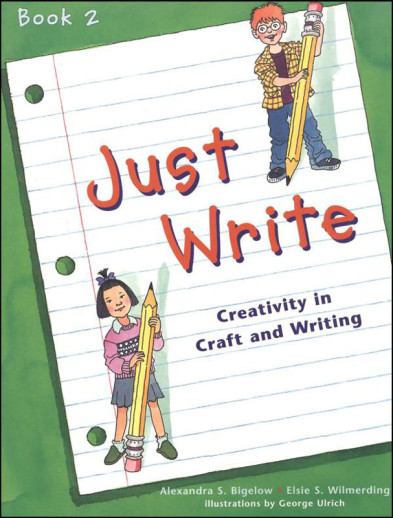We use cookies to make your experience better. To comply with the new e-Privacy directive, we need to ask for your consent to set the cookies. Learn more.
Just Write Book 2
Just Write Book 2, for 3rd graders, has a little different format. It begins with some basic sentence, paragraph, and word skills, then with actually composing a story. Chapter 1 concentrates on the sentence and sentence construction. It reviews the basics of capitalization and punctuation then continues into subjects and predicates, parts of speech (adjectives and adverbs), adding detail, and combining sentences. Chapter 2 studies paragraph construction - much like the first level, only in more depth. Chapter 3 is essentially a review of topics covered in Chapter 7 of Just Write Book 1. Story writing begins in Chapter 4 which covers the same topics as in Level 1 and introduces dialogue and point of view. The last chapter covers editing and publishing. Both levels include some resource pages (story maps, webs, etc) in a Resource Materials chapter at the end. Because all material is reviewed in level 2, it is not necessary to use Level 1 first.
The Just Write program helps students become confident, expressive writers. This classroom-tested resource guides students through the writing process from initial idea to final edited and published narrative.
PRODUCT FEATURES- Just Write workbooks help students become confident and expressive writers through fun exercises, engaging text, and kid-friendly examples
- Book 2 presents capitalization, spelling, punctuation, and other grammatical rules yet simultaneously encourages students to start writing without any worry for such
- Dialogue and point of view are introduced, and editing and publishing are also covered
- Later chapters in this book focus on character and setting development and the use of creative, interesting details
- Just Write Books cover 9 weeks of lessons for Grade 2 to 3 writers and is useful for in-class work, homeschooling, or at-home learning
The authors wrote this series because they felt a strong need to introduce children to some of the elements of story writing and writing in general that would increase their success and pride in writing. Too often at this age students are given assignments to write stories or narratives with very little preparation or specific advice on how to accomplish this. This course seems a much more effective vehicle for teaching younger children to write than most I've seen - though there aren't many programs floating around for this grade level.
Focusing on the story, this program helps teach many of the elements and strategies of writing to beginners. Just Write Book 1, intended for 2nd graders, begins with planning to write a story and learning about story elements. The first chapter focuses on pre-writing activities: brainstorming, categorizing, and using a web. Chapter 2 studies some of the processes involved in writing the story - selecting a topic, learning about sequencing, planning the basic parts of a storyline (who, what, where, when and why), creating characters, revealing feelings, and choosing a setting.
The next chapters hit some of the nuts and bolts of putting words and sentences on paper. Chapter 3 studies capitalization and basic punctuation. Chapter 4 is about using your senses to create more vivid writing. Chapter 5 explores the paragraph - what it is, how to format it, what it's made of. Chapter 6 coaxes children to "tell more" (expand sentences beyond the kernel) and Chapter 7 instructs them to be choosy with their words - to avoid overused words and use creative comparisons (similes). The course closes in Chapter 8 with editing, choosing a title, and publishing. These chapters vary in length and include definitions of concepts, models, and interesting exercises for student practice.
Just Write Book 2, for 3rd graders, has a little different format. It begins with some basic sentence, paragraph, and word skills, then with actually composing a story. Chapter 1 concentrates on the sentence and sentence construction. It reviews the basics of capitalization and punctuation then continues into subjects and predicates, parts of speech (adjectives and adverbs), adding detail, and combining sentences. Chapter 2 studies paragraph construction - much like the first level, only in more depth. Chapter 3 is essentially a review of topics covered in Chapter 7 of Just Write Book 1. Storywriting begins in Chapter 4 which covers the same topics as in Level 1 and introduces dialogue and point of view. The last chapter covers editing and publishing. Both levels include some resource pages (story maps, webs, etc) in a Resource Materials chapter at the end. Because all material is reviewed in level 2, it is not necessary to use Level 1 first.
Just Write Book 3 takes students through the four writing styles necessary to not only complete the writing done in school, but also the writing done throughout life - narrative, descriptive, expository, and persuasive. With examples and models to help students understand concepts and planning and revision-oriented exercises forming a methodical approach to writing, some of the topics/skills introduced to students are: single- and multi-paragraph organization, paragraph transitions, sequence and chronological order, word choice, establishing audience and purpose, fact and opinion, and more. This book has some review of the skills taught in books 1 and 2, though almost all of it is new material for the series. Includes a glossary of literary terms.
The Teacher's Guide to each book is extremely helpful, providing specific teaching instructions, additional resource suggestions, an answer key, and some blackline masters. Enjoy!
| Product Format: | Softcover Book |
|---|---|
| Brand: | Educators Publishing Service |
| Grade: | 3 |
| ISBN: | 9780838826270 |
| Length in Inches: | 11 |
| Width in Inches: | 8.375 |
| Height in Inches: | 0.375 |
| Weight in Pounds: | 0.8 |

